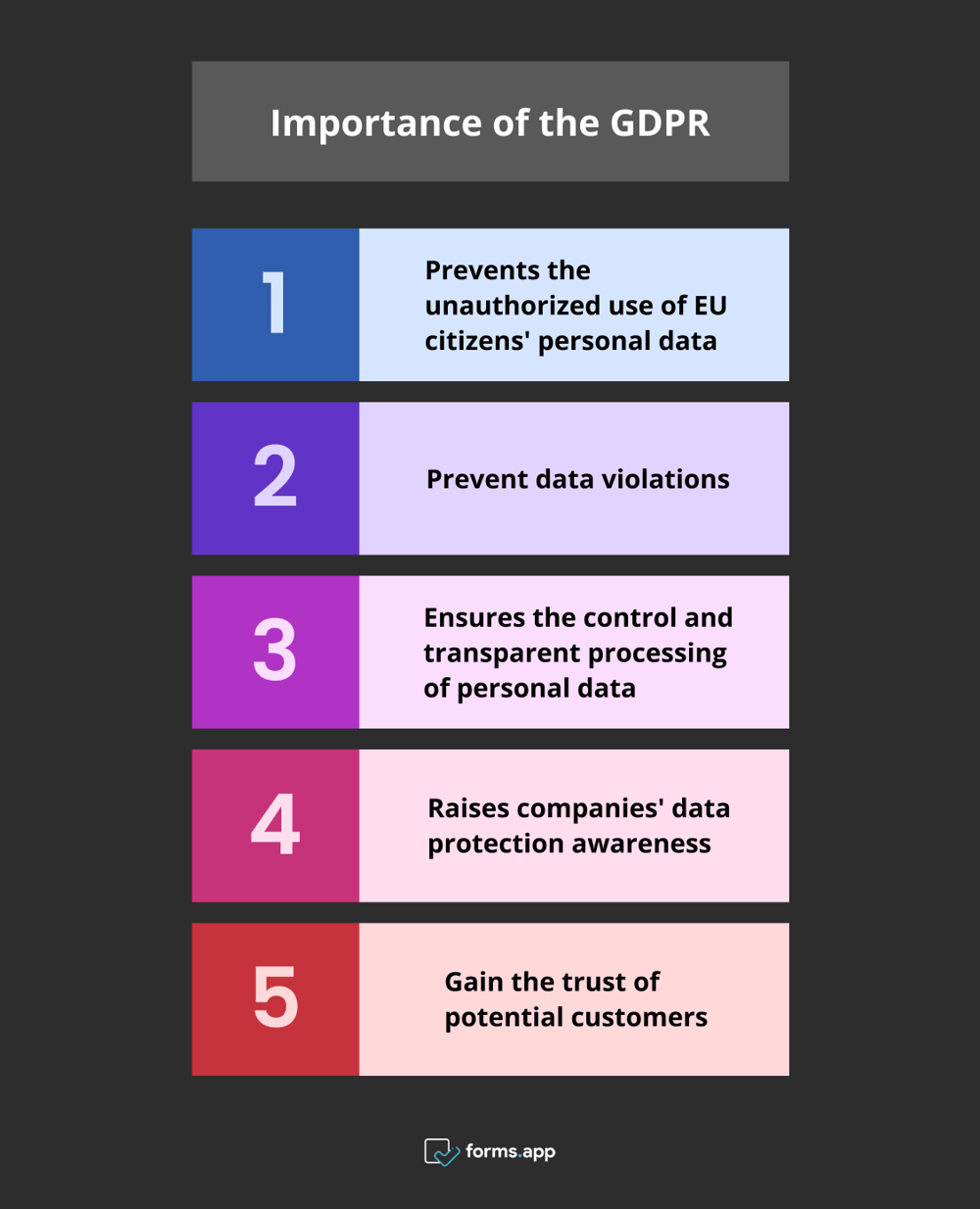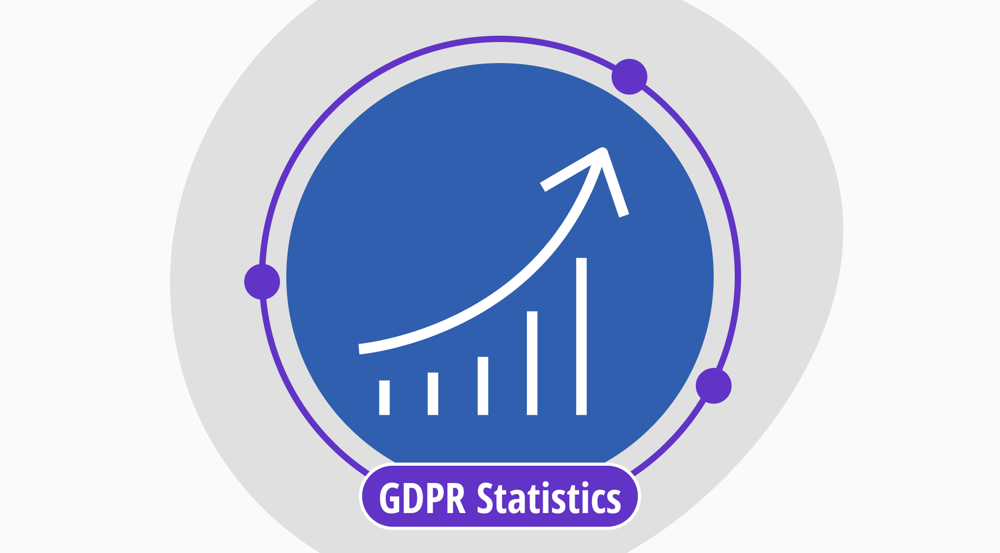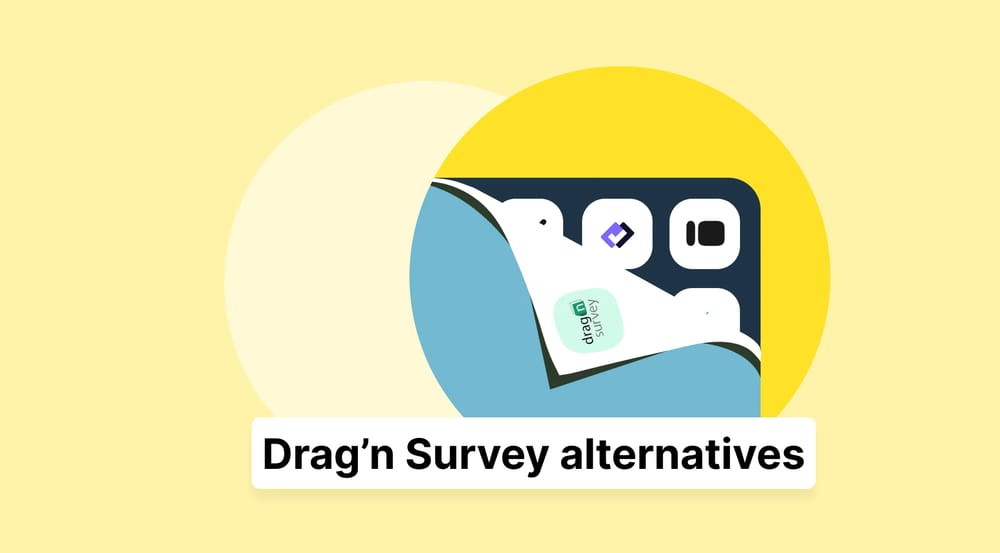The violation of personal data has become one of the biggest problems in our daily lives. Growing concerns about this issue have led to the need for data protection regulations. The General Data Protection Regulation (GDPR) is one of the most effective steps taken in this regard. With the GDPR, significant progress has been made in protecting EU citizens' data.
In this article, we have compiled 20+ GDPR statistics for you. With our GDPR compliance statistics, you can learn how you can comply with the standards and protect both yourself and your customers. Without wasting any more time, let's move on to our eye-opening article:
First things first: What is the GDPR?
The General Data Protection Regulation (GDPR) is a regulation within the EU designed to protect the data of EU citizens.
It binds all transactions involving the personal information of EU citizens and all businesses that use this information. It imposes deterrent sanctions on all companies that obtain and process this information without complying with the GDPR. These sanctions aim to protect personal data.
Importance of the GDPR
Companies that process data without complying with the GDPR are subject to significant financial penalties. Data breach notifications are mandatory for companies within the specified period. In this way, the GDPR encourages companies to protect personal data. Businesses that comply with it protect themselves from financial penalties. In addition, some of the benefits of GDPR can be listed as follows:

Pros of the GDPR
💡The GDPR prevents the unauthorized use of EU citizens' personal data and ensures that data is processed properly.
💡The GDPR imposes sanctions on businesses that do not comply with the standards, and these sanctions prevent data violations.
💡It ensures the control and transparent processing of personal data.
💡It raises companies' data protection awareness and encourages them to protect individuals' personal data.
💡It enables companies that comply with GDPR to gain the trust of potential customers.
20+ Essential GDPR statistics
The 20+ GDPR statistics and GDPR data examples will inform you about what GDPR means and show you everything you need to know about protecting personal data. You will also learn why GDPR is important and why you need to comply with the standards. Let's move on to the valuable statistics we have prepared for you:
1. The cost of GDPR fines is increasing yearly.
The General Data Protection Regulation aims to ensure the data security of individuals and to be able to control this data. The costs of GDPR breaches have increased every year since it first entered into force. According to Statista, the average cost of a GDPR violation increased from approximately 500,000 euros in 2019 to 4.4 million euros in 2023.
The increasing costs of fines for GDPR violations are forcing companies to be more careful in this regard. In addition to the increase in the costs of fines, audits are also becoming more frequent. This situation also increases individuals' data security.
2. GDPR fines exceeded 114 million euros in the first 20 months.
Businesses that do not comply with the General Data Protection Regulation (GDPR) face serious fines. The data from GDPR.eu shows that fines for the GDPR have exceeded 114 million euros in the first 20 months of implementation.
The GDPR aims to encourage companies to protect personal data. The fines for GDPR violations increase deterrence and encourage compliance with the regulation. To avoid the sanctions of the GDPR, you should prioritize protecting individuals' personal data and adopt the principle of transparency. As a first step, you can make sure that your forms are GDPR-compliant.
3. Amazon received the largest fine for GDPR violations.
With the GDPR, the EU has taken a considerable step forward in protecting the data of its citizens. Companies that do not fulfill their requirements face the consequences of GDPR violation. According to Statista, e-commerce giant and digital powerhouse Amazon was fined 746 million euros in 2022 for breaking the GDPR, making it the online provider with the largest fine.
The fact that Amazon, one of the world's biggest companies, has faced such a large fine shows how serious the EU is about ensuring data security. Such sanctions should serve as a warning to other companies to fulfill their GDPR obligations.
4. Most Americans want the GDPR to be implemented in their country.
GDPR has developed a unique personal data protection model in EU countries and imposed fines on organizations that do not comply with it. Persona revealed that the majority of Americans (66%) want the US to implement personal data privacy legislation similar to GDPR.
Since the implementation of the GDPR in EU countries, these countries have made significant progress in data security. This sets an example for countries outside the EU. The fact that US citizens want regulations such as the GDPR to be implemented in their own countries reveals its impact.
5. GDPR encourages creative ways to use data.
In addition to introducing data processing and protection regulations, the GDPR has also contributed to the emergence of new data uses. The statistics provided by RSM confirm this. 58% of participants said that the GDPR has encouraged creative and new uses of data.
The regulations of the General Data Protection Regulation (GDPR) have pushed companies to implement different data protection methods. This has led to more creative and efficient data storage and processing methods. This is one of the benefits that GDPR offers to companies.
6. Most people believe that they have no control over the data collected about them.
The unauthorized and uncontrolled use of personal data by companies has become a common problem for many people. Pew Research Center found that 81% of US residents believe that they have no control over the data companies and the government collect about them.
The General Data Protection Regulation (GDPR) eliminates people's concerns about data misuse. It introduces the concept of a data controller to give individuals more control over their data. In this way, GDPR awareness is ensured, and possible violations are prevented as much as possible.
7. 53% of companies are prepared for GDPR.
According to Statista, businesses operating in the European Union and the United Kingdom (UK) were surveyed in April and May of 2023, and 53% felt prepared for the General Data Protection Regulation (GDPR). Of the companies surveyed, another 35% thought they were partially prepared, and 10% claimed they were only slightly prepared.
The GDPR holds companies accountable for irregularities in the protection of personal data. Organizations must report any data breach within 72 hours. Statistics show that almost half of the surveyed companies are ready for the GDPR requirements. This percentage should increase so that companies do not face sanctions.
8. Nearly a quarter of companies have poor cyber security.
The GDPR provides companies with specific standards to ensure data security. However, it is undeniable that companies have cybersecurity weaknesses. According to a study conducted by RSM, almost a quarter (21%) of companies state that they do not yet have a cybersecurity strategy.
This statistic shows that companies are incapable of ensuring the security of personal data. Appropriate security controls protect data against cyber-attacks. It is also an important step for companies to be transparent about their data usage. Companies that comply with GDPR both fulfill their obligations and protect their users from possible cyber-attacks.
9. Only 50% of companies care about the data owner's consent when using personal data.
Consent for the use of personal data is one of the GDPR's biggest sensitivities. However, half of the organizations still lack this knowledge. Egress’s data shows that only 50% of firms have reviewed their methods for obtaining consent from third parties, leaving them at risk for non-compliance issues.
The processing of personal data is permitted by law or with the consent of the data owner. If personal data is processed without the data owner's permission, GDPR sanctions step in. For this reason, it is important for companies to be careful about consent, both for themselves and their customers.
10. Most businesses in the US are far from complying with GDPR standards.
Statista revealed that more than 91% of US businesses that were legally required to comply with the General Data Protection Regulation (GDPR) as of the fourth quarter of 2022 were underprepared to meet the privacy regulations. The businesses were utilizing manual services, which were costly and likely to make mistakes.
This statistic shows that countries outside the EU are highly unprepared to comply with GDPR standards. Thanks to the GDPR standards, the data security of EU citizens is significantly ensured. Implementing such data protection laws worldwide will prevent the uncontrolled spreading of people's personal data.
11. 79% of respondents do not trust companies to use their data.
Regulations like GDPR are essential to ensure people's data security and prevent unauthorized data processing. A statistic published by Persona shows that the vast majority of respondents are concerned about their personal data. In the US, 79% of individuals are worried about how companies use their personal data.
People's concern about the security of their personal data shows us how vital regulations like GDPR are. The GDPR controls and limits companies' use and processing of data. It imposes financial sanctions for data processed outside the permitted purposes and is based on transparency. For these reasons, GDPR will address people's sensitivities about their data.
12. Companies struggle to comply with general data processing principles.
Statista proved that as of June 2022, the majority of fines were attributed to businesses' failure to comply with general data processing principles; as a result, over 845 million euros were in penalties. With fines totaling 447 million euros, the second most frequent violation was an insufficient legal basis for data processing.
This statistic shows that companies have the most trouble complying with general data processing principles. It is essential to learn what your obligations are in this regard. By complying with the GDPR's general data processing principles, you can ensure your customers' data security and avoid potential sanctions.
13. Thousands of websites are attacked every month to obtain personal data.
The GDPR aims to protect information specific to individuals' physical, physiological, genetic, mental, economic, cultural, or social identity from potential violations. Many attempts are being made to obtain this type of personal information. A study conducted by Persona showed that every month, 4800 websites fall victim to form-jacking.
The fact that 4800 websites are attacked every month to capture personal data shows the importance of practices like GDPR. You can ensure the security of your customers' data by complying with GDPR standards on your website and social media accounts.
14. GDPR is driving companies to increase their investments in cybersecurity.
A helpful study conducted by RSM revealed GDPR’s positive effects on companies. Approximately 73% of European organizations report that the GDPR has motivated them to enhance their customer data management practices, and 62% report that it has increased their cyber security investments.
The GDPR has raised awareness among organizations about personal data protection. In addition, the deterrent penalties of the GDPR have pushed organizations to comply with the GDPR. Compliance with GDPR shows that organizations value and care for their users.
15. Organizations that comply with GDPR gain trust.
A study by Cisco revealed how much respondents trust the General Data Protection Regulation (GDPR) to protect their personal data. Companies that use their personal data in accordance with GDPR laws are more likely to be trusted, according to 47% of respondents.
Companies that fulfill the requirements of GDPR gain the trust of customers. Potential customers tend to prefer companies that they believe will be careful to protect their personal data. This shows that companies that pay attention to GDPR standards will increase their brand awareness and customer satisfaction.
16. The level of GDPR awareness is increasing.
Statista showed that the UK had the highest level of GDPR awareness in 2018, the year the GDPR was first implemented, with 32% of respondents stating that they are aware of the new regulation. The percentage of UK respondents who agreed with the statement rose to 73% in 2022.
This eye-opening statistic shows that people's awareness of data protection is growing. Thanks to the GDPR, companies, and public authorities that have become more aware are contributing to increasing data security day by day. This prevents collecting and processing personal information unconsciously.
17. More than half of people think their data is being collected and used.
Data is collected from everyone who uses companies' websites for reasons such as online shopping. More than six in ten (%62) of the participants of the Pew Research Center think it is impossible to go about daily life without having firms acquire their personal data. The GDPR plays a significant role in ensuring the security of this data.
The vast majority of people know that companies use personal information such as IP addresses and expect this information to be secured. The GDPR aims to prevent data violations and protect directly or indirectly identified or identifiable natural persons. It prevents the abuse of data obtained by companies.
18. Almost half of people in the US are concerned about the protection of their personal data from hackers.
People are becoming more and more aware of the protection of their personal or biometric data. This is illustrated by a statistic from a survey conducted by Persona. 47% of the people from the US state that they are worried about hackers accessing their personal data.
By complying with GDPR standards, security measures are taken against illegal access and processing of personal data. Companies and organizations will gain trust if they know more about GDPR and comply with its requirements. Complying with GDPR requirements will ensure that data is protected to the extent necessary so that data subjects will feel safe.
19. GDPR standards have improved 31% of respondents' experiences with companies.
Since the GDPR came into force, significant steps have been taken to protect individuals' personal data. However, it is seen that the intended level of data protection has not been reached. Marketing Week proves that only 31% of consumers believe that since the implementation of GDPR, their overall experience with companies has improved.
Companies paying more attention to protecting individuals' data will increase individuals' trust in them. This can be possible by fully complying with GDPR standards. Fulfilling the requirements of the GDPR will enable companies to improve the customer experience. Therefore, you should not neglect to implement GDPR standards in your company.
20. Data exchanges not complying with GDPR standards have serious consequences.
Exchanges interfering with the secure processing of EU citizens' data can result in serious penalties. Statista's data provides an example in this context. Facebook's EU-US data transfers put EU citizens' data at risk, and the EU fined Meta 1.2 billion euros in May 2023 for breaking digital privacy laws.
The General Data Protection Regulation (GDPR) aims to ensure the secure processing of EU citizens' data. Penalties for data violations cause reputational damage to companies in addition to financial damage. Therefore, you should make arrangements in your company in accordance with the standards of GDPR by using GDPR-compliant form builders.
Final words
The GDPR has raised the awareness of EU citizens on data security and largely prevented the misuse of personal data. In this article, you have learned what GDPR is and its importance by reading 20+ GDPR statistics. In this way, you can protect your customers from possible data misuse by acting more consciously about protecting personal data.
Now you know everything you need to know about GDPR, and you can put it into practice!
forms.app, your free form builder
- Unlimited views
- Unlimited questions
- Unlimited notifications



